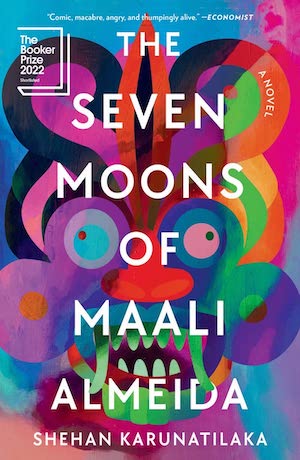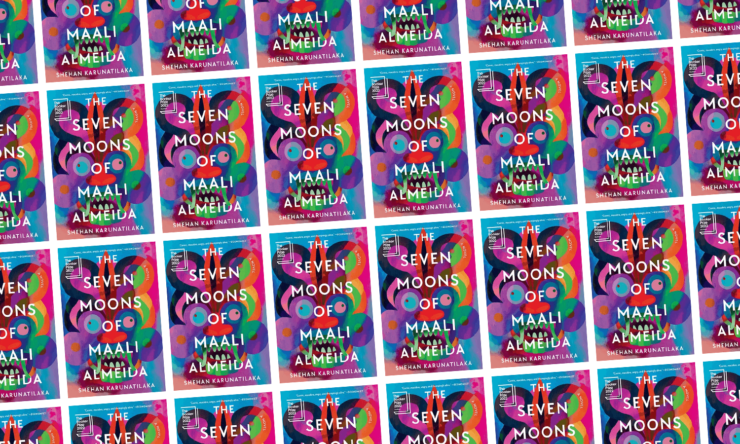Shehan Karunatilaka’s second novel The Seven Moons of Maali Almeida won the Booker award a few weeks ago, a huge feat for a book that ignored by western publishers for years, with an earlier version published in India in 2020. Even though Karunatilaka had won the Commonwealth prize for his debut Chinaman in 2012, mainstream western publishers hesitated to publish Seven Moons, afraid that the story of a photographer working during the Sri Lankan civil war in the 1980s would feel much too alien to their audience, given Sri Lanka’s complicated politics and Karunatilaka’s unapologetic use of local syntax, slang, colloquialisms, mythology and culture to depict a world that many western readers may not know much about. If you don’t know anything about the Sri Lankan people, culture or politics, Karunatilaka may help you out here and there, but not keeping up is your loss, not his. He is not here to pander to anyone, nor play to the gallery, and the book is all the stronger for it.
And so the novel starts with a dead man. Colombo resident Maali Almeida can’t recall how he died, or why, and so the reader doesn’t know either. The narrative unspools the mystery of Mali’s death? Murder? Suicide? No one knows, least of all Maali.
We find out as he does, when he is given a week (the titular seven moons) in limbo, to figure out what happened to him, and where he needs to be next. Purgatory acts as a foil to the real world. There are multiple warring factions, much intrigue, lies and deception, and of course also some hope with the potential light at the end of it all. If in death it is the dark and light vying for Mali’s attention, in the real world there are the Sri Lankan military, the Tamil Tigers who want a separatist state, the JVP who want to overthrow the capitalist state, the Special Task Force who do terrible things on behalf of the government and hire ‘garbage men’ to destroy the evidence, ‘peacekeepers’ from India who will raze villages to keep said ‘peace’, the UN, the CIA, random insurgents, and even some international arms dealers who frequent Colombo’s casinos. Now, in purgatory, Maali is able to observe both worlds, though only interact with one. He finds them to be not too different, after all.
‘Being a ghost isn’t that different to being a war photographer. Long periods of boredom interspersed with short bursts of terror. As action-packed as your post-death party has been, most of it is spent watching people staring at things. People are a lot, break wind all the time, and touch their genitals much too much.’
Buy the Book


The Seven Moons of Maali Almeida
The problem is, self proclaimed ‘photographer. Gambler. Slut’, Maali was in bed with a rather lot of unsavoury people—and that doesn’t even include his actual lovers. He’s photographed a lot of things that could ‘bring down governments’ and could ‘stop wars’; thing that could’ve got him killed, for any number of people who could’ve easily had him knocked off, and in death he is struggling to narrow this list down.
Meanwhile the afterlife is full of ghosts, ghouls, demons and worse. But so is the real world. He soon finds out that his body has been dismembered, his skull has sunk to the bottom of a lake, that his closest friends, his lover, and his mother have no idea what’s happened to him. As they try to find Maali, or at least find out what happened to him and why, Maali helplessly watches them put themselves in increasing danger. How can he warn them away, how can he made amends? He is barely a whisper on the wind, though there are beings in the afterlife who claim they can offer him the ability to whisper to his friends. Can he trust them? Will the cost be worth it? Maali, as we soon find out, isn’t the best at making good decisions, not even in death.
What he is though, is an entertaining, loquacious but unreliable narrator from the start. He’s constantly telling us how much he can’t remember, and what he does remember does not tell us anything very positive about his character. We know about his bad behaviour right away; we know from the start that he lies to his best friend, constantly cheats on his lover, takes money from terrible people to photograph atrocities that he hides the evidence of, isn’t honest to a single person he knows, gambles, drinks too much, hasn’t checked in on his mother in years and has no real authentic connections in life. We know he’s a rubbish friend, partner, colleague and son. But does that make him evil, or just misguided? Does he want actively to hurt those around him, or is he just another broken, selfish human with his own trauma? For Maali is self aware, even in death, and questions his own mind, often.
‘You’ve always thought the voice in your head belonged to someone else. […] It was the voice that led you to tour the war zone on five occasions, each for a different master. It was the voice that led you to casinos and alleyways and strange boys in dark jungles. And yet you wonder about that voice. If you had a spirit on your back whispering in your ear, how would you possibly know? And, even if you did, how could you separate that voice from every other whisper?’
Partly narrated in a deft second person, with the rest told by Maali as he wanders around trying to figure out his death and keep his friends safe. If the narrative proves a little difficult to fully immerse in at the start, Maali’s voice is immediately arresting, and the final act of the book is magnificent. The language soars—it’s a bird in flight: powerful, effortless, with a voice that rings true in its authenticity. The book fast become a thriller, with a perfectly paced denouement, as Maali and the reader both see things come apart and then come together again in the right order, memories fall into place, jigsaw pieces land where they should and the final missing piece appears to solve the whodunnit.
The Seven Moons of Maali Almeida is a ghost story, it’s absurdist dark comedy, an irreverent, audacious magic realist murder mystery. It’s a novel about Sri Lanka’s gruesome, violent civil war; a novel about the people who live through it and those who died, and the fate of the country after. It feeds off Vonnegut, off Rushdie, and ultimately it’s a novel about the most human things of all: love, friendship and surviving via the stories we tell.
‘You want to ask the universe what everyone else wants to ask the universe. Why are we born, why do we die, why anything has to be. And all the universe has to say in reply is: I don’t know arsehole, stop asking. The Afterlife is as confusing as the Before Death, the In Between is as arbitrary as the Down There. So we make up stories because we’re afraid of the dark.’
The Seven Moons of Maali Almeida is published by W. W. Norton & Company.
Mahvesh loves dystopian fiction and appropriately lives in Karachi, Pakistan. She writes about stories when not wasting much too much time on Twitter.










